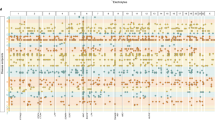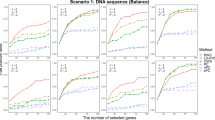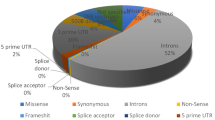Abstract
The purpose of this study was to assess the impact of genetic self-knowledge (nondisease genotype information) on individual self-concept and Health Orientation Scale (HOS). Adult volunteers (n=257) were recruited from an ongoing genetic association study identifying muscle quantitative trait loci (QTLs). Participants completed psychosocial assessments before and after 12 weeks of resistance training of the nondominant arm. At study exit, a genetic counselor informed participants of genetic test results on three to four genes that have an association with muscle-related traits, and counseled subjects on the potential significance of these findings. The second psychosocial assessment was performed immediately following this counseling session. The Tennessee Self-Concept Scale v.2 (TSCS:2) and the HOS showed female subjects to have a significantly greater positive change between first and second assessments, relative to male subjects. Most self-concept subscales improved significantly, when ‘neutral’ genotypes (no anticipated beneficial or deleterious impact) were reported, compared to positive genotypes. TSCS:2 subscales showing improvement included: total (P=0.013); physical (P=0.004); satisfaction (P=0.019); and behavioral (P=0.047). HOS subscales showing improvement included health image concern (P=0.006); and health expectations (P=0.047). In conclusion, these results suggest that genetic self-knowledge affects self-concept, consistent with the ‘attribution’ theory. Individuals who received neutral genetic information attributed positive changes from the exercise program to their own abilities, while those who received positive information were more likely to attribute positive changes to their genetics. This study is limited by the ability to determine the direction of the impact of nondisease genetic information presented to participants.
Similar content being viewed by others
Log in or create a free account to read this content
Gain free access to this article, as well as selected content from this journal and more on nature.com
or
References
Clow CL, Scriver CR : Knowledge about and attitudes toward genetic screening among high school students: the Tay Sachs experience. Pediatrics 1977; 59: 86–91.
Marteau TM, van Duijn M, Ellis I : Effects of genetic screening on perceptions of health: a pilot study. J Med Genet 1992; 29: 24–26.
Woolridge EQ, Murray R : The health orientation scale: a measure of feeling about sickle cell trait. Soc Biol 1988; 35: 123–136.
Hampton ML, Anderson J, Lavizzo BS, Bergman AB : Sickle cell ‘nondisease’: a potentially serious public health problem. Am J Dis Child 1974; 128: 58–61.
Taylor CA, Myers R : Long-term impact of Huntington Disease linkage testing. Am J Med Genet 1997; 70: 365–370.
Reed T, Fabsitz RR, Selby JV, Carmelli D : Genetic influences and grip strength norms in the NHLBI twin study males aged 59–69. Ann Hum Biol 1991; 18: 425–432.
Arden NK, Spector TD : Genetic influences on muscle strength, lean body mass, and bone mineral density study. J Bone Miner Res 1997; 12: 2076–2081.
Frederiksen H, Gaist D, Petersen HC et al: Hand grip strength: a phenotype suitable for idnetifying genetic variants affecting mid- and late- life physical functioning. Genet Epidemiol 2002; 23: 110–122.
Thomis MA, Beunen GP, Maes HH et al: Strength training: importance of genetic factors. Med Sci Sports Exerc 1998a; 30: 724–731.
Thomis MA, Beunen GP, Van Leemputte M et al: Inheritance of static and dynamic arm strength and some of its determinants. Acta Physiol Scand 1998b; 163: 59–71.
Tiainen K, Sipila S, Alen M et al: Heritability of maximal isometric muscle strength in older female twins. J Appl Physiol 2004; 96: 173–180.
Thompson PD, Moyna N, Seip R et al: Functional polymorphisms associated with human muscle size and strength. Med Sci Sports Exerc 2004; 36 (7): 1132–1139.
Montgomery H, Clarkson P, Barnard M et al: Angiotensin-converting-enzyme gene insertion/deletion polymorphism and response to physical training. Lancet 1999; 353: 541–545.
Gayagay G, Yu B, Hambly B et al: Elite endurance athletes and the ACE I allele--the role of genes in athletic performance. Hum Genet 1998; 103: 48–50.
Roth SM, Schrager MA, Ferrell RE et al: CNTF genotype is associated with muscular strength and quality in humans across the adult age span. J Appl Physiol 2001; 90: 1205–1210.
Buemann B, Schierning B, Toubro S et al: The association between the val/ala-55 polymorphism of the uncoupling protein 2 gene and exercise efficiency. Int J Obes Relat Metab Disord 2001; 25: 4467–4471.
Astrup A, Toubro S, Dalgaard LT et al: Impact of the v/v 55 polymorphism of the uncoupling protein 2 gene on 24-h energy expenditure and substrate oxidation. Int J Obes Relat Metab Disord 1999; 23: 1030–1040.
Clarkson PM, Devaney JM, Gordish-Dressman H et al: ACTN3 Genotype is Associated with Increases in Muscle Strength and Response to Resistance Training in Women. J Appl Physiol 2005, February 17 [E-pub ahead of print].
Fitts WH, Warren WL : Tennessee self-Concept Scale: Second Edition (TSCS:2). Los Angeles: Western Psychological Services, 1996.
Snell WE, Johnson G, Lloyd PJ, Hoover MW : The Health Orientation Scale: A measure of psychological tendencies associated with health. Eur J Personal 1991; 5: 169–183.
Hubal MJ, Gordish-Dressman H, Thompson PD et al: Variability in muscle size and strength gain following unilateral resistance training. Med Sci Sports Exerc, in press.
Weiner B : A theory of motivation for some classroom experinces. J Educ Pyschol 1979; 71: 3–25.
Weiner B : An attributional theory of achievement motivation and emotion. Psychol Rev 1985; 92: 548–573.
Weiner B : Judgments of Responsibility: A Foundation for a Theory of Social Conduct. New York: Guilford, 1995.
Overbay JD, Purath J : Self-concept and health status is elementary-school-aged children. Issues Compr Pediatr Nurs 1997; 20: 89–101.
Stein PN, Motta RW : Effects of aerobic and non-aerobic exercise on depression and self-concept. Percept Mot Skills 1992; 74: 79–89.
Ossip-Klein DJ, Boyne E, Bowman ED et al: Effects of running or weight lifting on self-concept in clinically depressed women. J Consult Clin Psychol 1989; 57: 158–161.
Tucker LA : Effect of a weight-training program on the self-concepts of college males. Percept Mot Skills 1982; 54: 1055–1061.
DiLorenzo TM, Bargman EP, Stucky-Ropp R et al: Long-term effects of aerobic exercise on psychological outcomes. Prev Med 1999; 28: 75–85.
Rankinen T, Perusse L, Rauramaa R et al: The human gene map for performance and health-related fitness phenotypes: the 2003 update. Med Sci Sports Exerc 2004; 36: 1451–1469.
Plotnikoff RC, Brez S, Hotz SB : Exercise behavior in a community sample with diabetes: understanding determinants of exercise behavioral change. Diabetes Educ 2000; 26: 450–459.
Walcott-McQuigg JA : Psychological factors influencing cardiovascular risk reduction behaviour in low and middle income African American women. J Natl Black Nurses' Assoc 2000; 11: 27–35.
McCaleb A : Global and multidimensional self-concept as a predictor of health practices in middle adolescents. J Child Adolesc Psychiatr Nurs 1995; 8: 18–26.
Macgregor ID, Regis D, Balding J : Self-concept and dental health behaviours in adolescents. J Clin Periodontol 1997; 24: 335–339.
Noakes TD : Tainted glory—doping and athletic performance. N Engl J Med 2004; 351: 847–849.
Bjerklie D, Park A : How doctors help the dopers. Time 2004; 164: 58–62.
Henn W : Consumerism in prenatal diagnosis: a challenge for ethical guidelines. J Med Ethics 2000; 26: 444–447.
Knoppers BM, Isasi RM : Regulatory Approaches to reproductive genetic testing. Hum Reprod 2004; 19: 2695–2701.
American Medical Association: Ethical issues related to prenatal genetic testing. The Council on ethical and judicial affairs. Arch Fam Med 1994; 3: 633–642.
William C, Alderson P, Farsides B : Too many choices? Hospital and community staff reflect on the future of prenatal screening. Soc Sci Med 2002; 55: 743–753.
Murray TH : Assessing genetic technologies. Two ethical issues. Int J Technol Assess Health Care 1994; 10: 573–582.
Acknowledgements
We thank Dr Thomas W Miller at the University of Connecticut for his assistance and support. This work was supported in part by a grant from the NIH (NS40606) with cosupport from NINDS, NIA, and NIAMS. The assistance of the Parsons Family Foundation is gratefully acknowledged.
Author information
Authors and Affiliations
Corresponding author
Rights and permissions
About this article
Cite this article
Gordon, E., Gordish-Dressman, H., Devaney, J. et al. Nondisease genetic testing: reporting of muscle SNPs shows effects on self-concept and health orientation scales. Eur J Hum Genet 13, 1047–1054 (2005). https://doi.org/10.1038/sj.ejhg.5201449
Received:
Revised:
Accepted:
Published:
Issue date:
DOI: https://doi.org/10.1038/sj.ejhg.5201449
Keywords
This article is cited by
-
The psychometric properties of the Italian adaptation of the Health Orientation Scale (HOS)
Health and Quality of Life Outcomes (2020)
-
Deaf Genetic Testing and Psychological Well‐Being in Deaf Adults
Journal of Genetic Counseling (2013)
-
Effect of Pre‐test Genetic Counseling for Deaf Adults on Knowledge of Genetic Testing
Journal of Genetic Counseling (2012)
-
The Prospect of Genome‐guided Preventive Medicine: A Need and Opportunity for Genetic Counselors
Journal of Genetic Counseling (2010)



